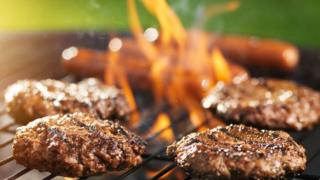 Image copyright
Image copyright
rez-art/ Thinkstock
The Food Standards Agency is warning people not to eat burgers that are pink in the middle, to avoid the risk of food poisoning at summer barbecues.
It says cases of food poisoning double in summer months – in part due to undercooked meat.
Officials say burgers must be cooked until they are steaming hot all the way through.
The warning comes as an online survey of 2,708 people suggests one in 10 prefers their meat rare.
And 81% of the adults polled by the FSA said they had eaten undercooked burgers at home.
Image copyright
bernjuer
Why shouldn’t burgers be eaten rare?
The FSA says some people mistakenly think rare burgers are safe to eat at home, because steaks can be safely served this way.
But the agency says steaks are different to burgers.
With steaks, any harmful bacteria sit on the surface of cuts of meat and can be killed off by searing or cooking, even if the middle is left rare.
Burger meat, on the other hand, is minced and mixed together, so harmful bugs can get to the centre of the meat and will not be killed unless heated to the right temperature.
Officials says this advice holds even for expensive burgers or products labelled as “steak burgers”.
And burgers should be cooked until the juices run clear.
Some restaurants do serve burgers that are rare, but their chefs must follow strict rules.
Image copyright
DANIELA BECKMANN / SCIENCE PHOTO LIBRARY
Where do harmful bugs come from?
Bacteria such as salmonella and E. coli present on animals’ hides or guts can get on to the surface of meat as it is being cut and prepared for sale.
And once meat is minced, these bugs can end up in the middle of burgers.
How does cooking reduce food poisoning risks?
Although bacteria need heat to grow, this tends to happen at between 8 and 60C.
Above 60C bacteria start to die.
Cooking also causes proteins in bacteria to break up.
These proteins need to be heated for long enough and at high enough temperatures for them to break down, rendering the bacteria harmless.
Image copyright
Christopher Robbins
Tips for safe barbecues
The usual hygiene advice applies – store uncooked meat separately from cooked meat.
Raw chicken must not be washed, experts warn.
FSA advice also suggests pre-cooking chicken in the oven before finishing it on the barbecue.
And it says the same advice can be applied when cooking sausages, burgers and kebabs for large numbers of people.
Meanwhile, disposable barbecues may need extra attention as they can take longer to heat up to the required temperature.
Barbecued rare burgers ‘pose food poisoning risk’

